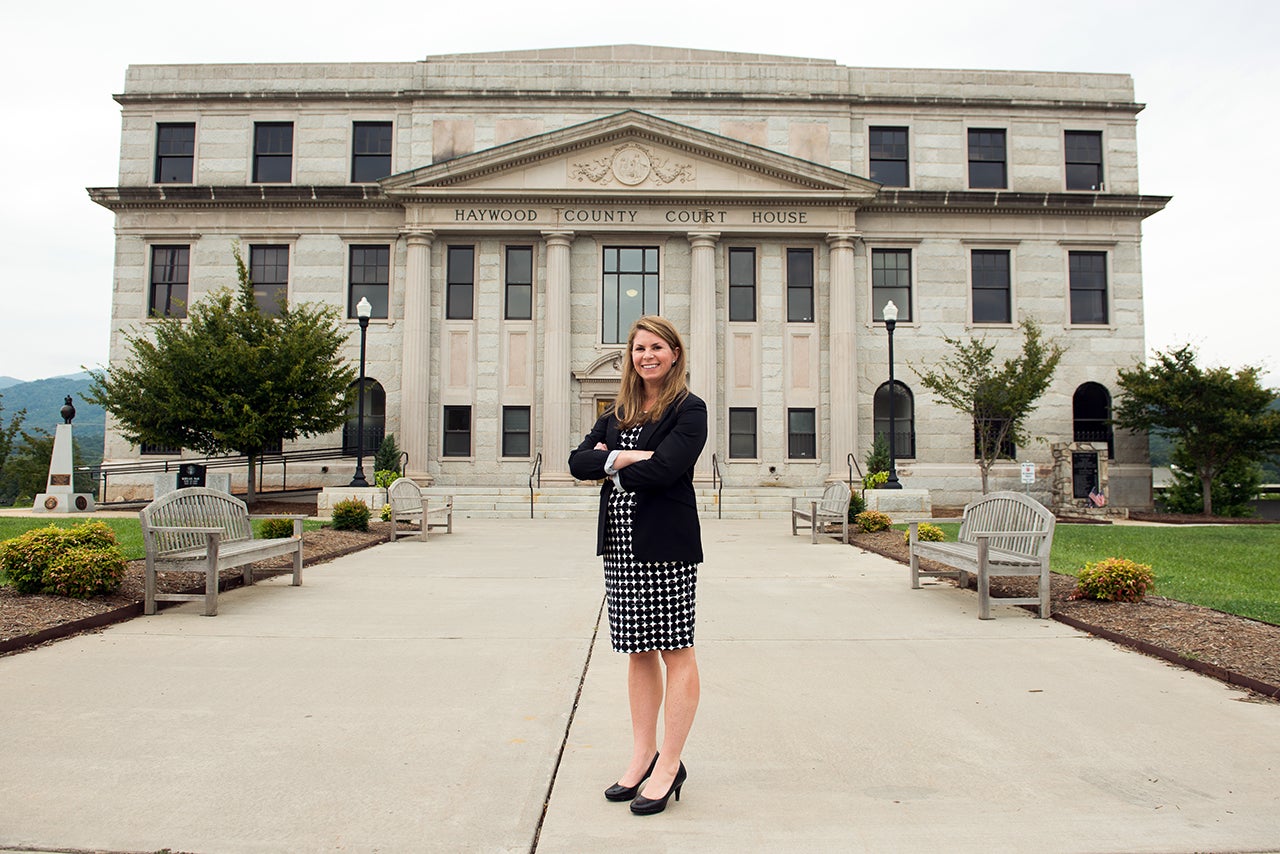DUI. Assault and battery. Robbery. Theft. Homicide. Add any other criminal offense to the list. Kate Wrenn ’06 has seen it all.
As assistant district attorney for the Haywood County District Attorney’s Office in Waynesville, North Carolina, Wrenn is one of only three prosecutors who handle all felony and misdemeanor cases for the Asheville suburb of 60,000 residents. On any given day she’s juggling cases involving incidents of domestic violence, sexual assault, robbery, theft, drugs, DUI, physical assault or even murder or manslaughter.
“Every single day is different,” says Wrenn, whose maiden name is Robinette. “Nothing is ever the same.”
And that is exhilarating, challenging, exciting and, often times, hard. Really hard.

Kate Wrenn ’06 turned two degrees in political science and Spanish into a successful career as a prosecutor. (Photo by Reese Moore)
“Every single case involves somebody’s life,” says Wrenn, noting the weight that the human element of crime and punishment can have on all involved. “That’s part of figuring out justice. You have to weigh the strength of the evidence and also consider whether a person needs to be a convicted felon or have an opportunity to get his or her life together and do what’s right.”
But just like the complex world of criminal law, Wrenn’s journey to a career as a prosecutor was anything but clear cut. She majored in political science with the idea that law school might be on the horizon. But a bout with appendicitis in the middle of prepping for the LSAT during her senior year led the then-22-year-old to rethink her career plans.
After earning her bachelor’s degree in political science in 2005, the inquisitive young woman decided to return to CofC after a backpacking trip in Europe convinced her to turn her already-completed Spanish minor into a second undergraduate degree. So, in 2006, Wrenn earned her second bachelor’s degree in Spanish.
While completing her Spanish degree, Wrenn volunteered with interpreter services at the Medical University of South Carolina and that led her to enroll in MUSC’s Master in Health Administration program. But after taking a health law class, the siren song of the scales of justice called to her again. With encouragement from the late CofC political science professor William Moore (for whom a CofC scholarship is named), Wrenn was accepted to the Charleston School of Law in 2008.
She thought she’d parlay her master’s degree in health administration along with her J.D. into a career in health law, but a year spent working as a law clerk for a judge with the Sixth Judicial Circuit in South Carolina made her rethink her plans again.
“I was still interested in health law, but also realized the criminal side of it was fascinating to me as well,” says Wrenn. “I found it absolutely fascinating – all that goes into the legal process from someone getting charged with a crime to a defense attorney meeting with the defendant to working with law enforcement to interviewing victims and witnesses to reviewing the evidence. Seeing the case all the way through the court process was something that I guess you could say I became addicted to.”
After a brief stint in 2012 as a public defender in Sumter County, South Carolina, Wrenn made the switch from the defendant’s table to that of the prosecution’s, joining the Seventh Circuit Solicitor’s Office in Spartanburg, S.C., before taking her current position in Haywood County in 2015.
There’s no question, it’s gritty work. As a mother of a one-year-old boy and a second child on the way next year, Wrenn says the hardest cases are those involving the sexual abuse of children.
“They are, by far, without question, the most difficult cases to deal with,” she says, adding that it’s a crime that is far too common in society.
It’s the quiet gratitude from a victim or business owner – or even on rare occasions a defendant – that keeps Wrenn motivated.
“It very often times feels like a thankless job,” she says. “It seems like very seldom both sides are satisfied. One side feels the sentence isn’t harsh enough. The other side feels like it’s too harsh. But occasionally I’ll be at the grocery store and either a defendant, victim or a family member will come up to me and say ‘thank you for everything you did for us.’ It doesn’t happen very often, but when it does, it feels good.”
Featured photo by Reese Moore.




